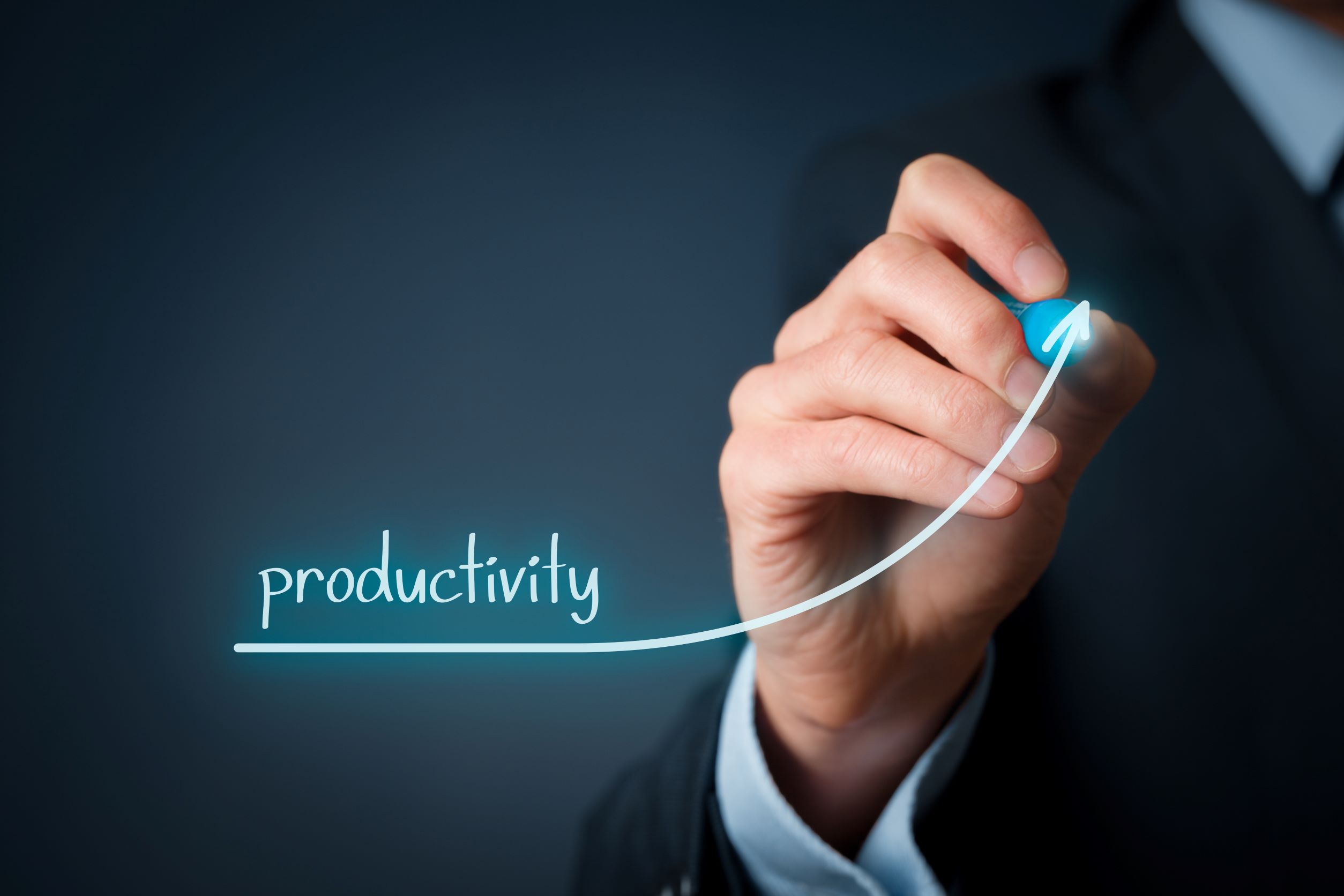“The way to get started is to quit talking and begin doing.” Walt Disney
Are you looking for ways to increase your working efficiency? If so, you’re not alone. Many business owners are always looking for new and improved ways to get things done. Fortunately, a few simple tips can help you boost your productivity without too much effort. So check out the following pointers and see how they work for you. You might be surprised at just how much of a difference they make.
Work efficiency is the ability to get the most productivity with the least possible energy use. It means doing more with less. When you improve efficiency, you can get a larger output from the same level input, or even less. For employees, this means getting more done in a finite amount of time: the workday.
Efficiency in the workplace means when employees correctly carry out necessary tasks with the least time and effort. In essence, improving workplace efficiency is about helping employees work smarter, not harder. Therefore, if the goal is to increase productivity while reducing the amount of effort, how is this accomplished? Consider the following six points:
1) Plan your day the night before
Plans help you organize your schedule, meetings, and workload around the most important tasks you have for the day. Once you realize how much time you spend on organizing, prioritizing, and completing various tasks, you’ll be able to manage your workload for maximum efficiency.
If you plan your days the night before you, you’ll not only get more done in less time, you’ll also experience more flow. If you give yourself a basic framework for your days, you’ll be much more likely to pack your days with useful work that adds value to your life. Plans can be adjusted day to day to fit changing circumstances.
2) Set deadlines for yourself and stick to them
Deadlines help us achieve shared goals and keep complex projects on track. Deadlines make clear what we’re expected to deliver and when. Meaning we can take control of our work, free of confusion.
4 Better Ways to Create Deadlines That You’ll Stick To
- Make Them Urgent: Set deadlines the create urgency. Schedule deadlines as close to the present as possible. Instead of giving yourself a month to do something, tell yourself you’re getting it done this week.
- Make Them Personal: people fall into four category styles of planning: prioritizers, planners, arrangers, and visualizers. Prioritizers and planners plan their work schedules based on how much time each part of a given task will take. Arrangers tend to focus on feelings, and visualizers are motivated by considering the big picture.
- Make Them Actionable: try breaking down your projects into smaller, actionable steps. One way to cut your task into bite-size chunks is to imagine that you could only work in 10-minute segments.
- Make Them Meaningful: If there’s no accountability, there’s no reason to stick to a deadline. The solution here is to tell someone about it. For instance, tell your boss she can expect it early next week. Having an outside motivator prevents you from simply pushing off the task.
Having deadlines and meeting them can be an effective way to make sure you achieve your long and short-term goals. Regardless of their nature, deadlines can directly influence plans. Meeting a deadline is an important trait, but it takes discipline and determination.
How do deadlines affect motivation?
Knowing that you have an upcoming deadline can create enough pressure to help you overcome a lack of motivation. The time limitation generates or increases one’s commitment to the task and the urgency required to complete it. For example, setting a deadline for a job and associating some consequences with it can increase your commitment to meeting the deadline.
3) Take breaks throughout the day
Taking breaks refreshes the mind and eases the stress and exhaustion from working for long stretches. According to research, the “Aha moments” came more often to those who take regular breaks. Here are some recommended activities to do during work breaks: Effective breaks:
- Brew coffee or tea.
- Do a breathing exercise or meditate.
- Stare out of a window.
- Read a page of a book or a blog post.
- Tidy up a part of your room.
- Lie down with your eyes closed or nap.
- Stand up and stretch.
- Take a short walk.
Taking a break improves focus and concentration and provides the opportunity for an employee’s mental reset. After a pause, work can resume with more energy and motivation.
Conversely, working without taking a break or more breaks only leads to psychological and physical fatigue. It can even lead to burnout in the long run.
4) Delegate tasks whenever possible
Delegating is essential because leaders can’t and shouldn’t do everything themselves. Through delegation, owners or managers can divide work and allocate it to the employees. Furthermore, it helps reduce the workload of one individual to focus on more vital areas of work such as budget planning or business analysis.
Tasks That You Should Always Delegate
- Repetitive tasks: some examples of repetitive tasks are filing, data entry, and cleaning.
- Time-consuming work: Such as proofreading, research, and customer service.
- Projects or jobs that boost employee growth and skill development.
- Interesting tasks that help to increase employee motivation, commitment, and growth.
- Work that requires specialized skills, knowledge, experience, or education.
In basic economic theory, the more workers focus on one task, the more efficiently they become at the task. The process is called specialization. In contrast, the delegation of work by leaders encourages employees to specialize in completing a particular task. By specializing in one area, an employee can hone their skill, continually improving the quality and efficiency of their performance.
Through delegation, the manager-employee relationship becomes more meaningful. For example, delegating empowers employees, builds trust, and assists with professional development. And for leaders, it helps you learn how to identify who is best suited to tackle tasks or projects. The overall impact of delegation is an increase in work efficiency.
5) Use technology to your advantage
In economics, it is widely accepted that technology is the key driver of the economic growth of nations, regions, and cities. It is because technological progress allows for the more efficient production of more and better quality goods and services, which is what prosperity depends on. Similarly, technology helps to improve efficiency and productivity in the workplace.
At its most basic level, technology allows you and your employees to be more productive and efficient. Whether you’re using a word processing program that will enable you to edit with ease or an electronic bookkeeping system that pulls data at the touch of a keystroke, technology makes life easier.
Five ways technology is changing the modern workplace.
- Enhanced productivity: simple technological tools such as time management apps or desktop software have optimized working routines so that employees can focus on the most critical tasks at hand.
- Cooperative Collaboration: New information management systems, cloud technologies, and work-focused social media platforms now mean that collaboration can occur from any point in the world with the click of a mouse. Updated clients take seconds, files can be uploaded and edited by everyone, and video conferences can gather some of the greatest minds within your industry no matter where they are in the world.
- Better Security: companies are starting to take more initiative in updating their systems with state-of-the-art computer security software and algorithms.
- Improved cost management: New financial tools, including monitoring devices and accounting software, can help improve the way you manage your firm’s finances.
- Increased communication: Industry-specific social networking sites can link entire teams to a central hub of messages and files, increasing employee engagement. Also, leaders can now keep in touch with their mentees more conveniently than before, making sure that those in that position can get the guidance that they need when it’s needed.
Technology can play an essential role in creating lean and efficient processes. It can help you reduce or eliminate duplications and delays in the workflow and help you speed up by automating specific tasks.
6) Stay organized
Being organized means having the time and energy to ensure every aspect of a task is handled correctly and that each step of a project is completed correctly. Organizing and planning help you get your work done accurately, avoiding costly mistakes. Organizing your work and planning help you be more efficient and productive. Being well-organized and developing effective plans also allows you to achieve important goals and objectives.
Summarizing Working Efficiency
In short, work efficiency is the ability to get the most productivity the least possible energy expenditure. It means doing more with less. When you improve efficiency, you can get productivity from the same level of effort or even less. For employees, this means getting more done in a finite amount of time: the workday. To learn how we can help create a plan that will allow your team members to maximize their potential while minimizing waste.





